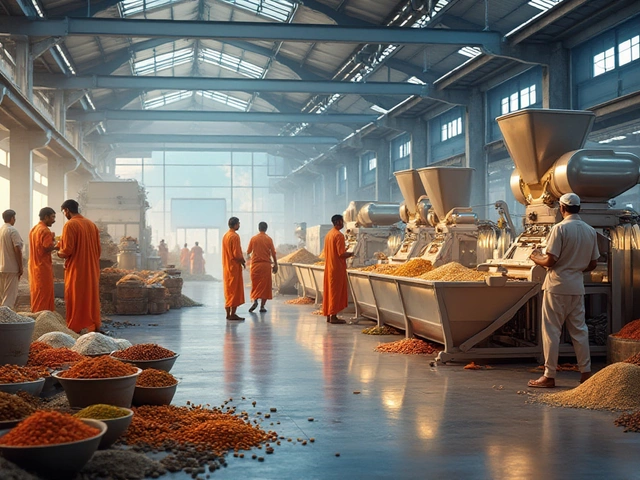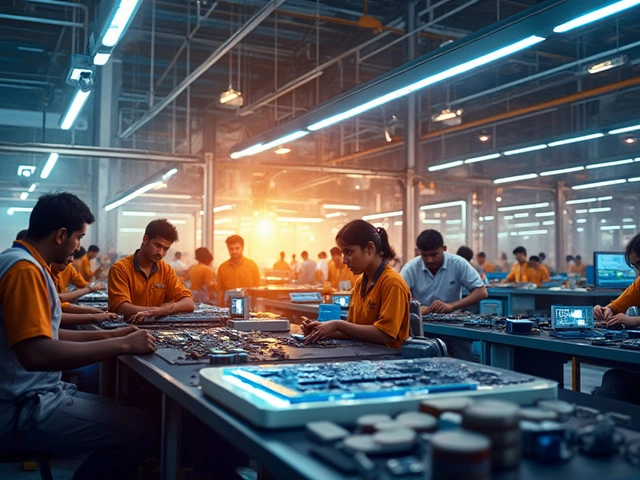If you picture factories, maybe you think of endless conveyor belts and towering warehouses with hundreds of workers. But what if I told you that some of the world’s most interesting, creative, and profitable success stories started on a much smaller scale—sometimes in a garage, a home kitchen, or a rented workshop tucked behind a corner shop? Small scale production isn’t some trend for the indie crowd. It’s a real business play, and often, it gives you an advantage the giants simply can’t match. Apple, Harley-Davidson, and even Ben & Jerry’s—all kicked off their empires small. The magic isn’t just nostalgia—it’s flexibility, control, and a direct line to your customers.
The Power of Flexibility
If there’s one thing big companies envy, it’s just how quickly a small operation can pivot. Imagine you spot a change in market demand—maybe there’s a sudden craze for oat milk in your town. In a huge dairy, new machines, long approval chains, and minimum contract sizes make ship-turning painful. But with small scale production, you could start experimenting with batches literally this week. It isn’t just about products, either. Maybe you need to switch suppliers, tweak packaging, or run a custom order for a loyal client. You don’t have to schedule a meeting with a boardroom full of suits. You just make the call.
Customization is where small businesses really shine. Ever bought something from an artisan metalsmith or a boutique coffee roaster? These folks can adjust to your needs—sometimes down to the color of the box or the grind of the beans. That level of personal touch has made customized gifts, limited runs, and even pop-up products incredibly popular. Consumer trends, social media, and viral moments move fast. If you’re small, you can keep up, or even get ahead, while big factories are still waiting for a committee to approve the first step.
If you want proof, look at how breweries exploded across the US and Europe in the last decade. Before 2000, getting a custom beer meant brewing it yourself. Today, 9 out of 10 Americans live within ten miles of a craft brewery, according to the Brewers Association. Those brands thrive because they’re nimble. When new hop varieties come out or someone dreams up a spicy new porter, small breweries can turn out a new beer in weeks, testing ideas by serving them fresh in their taprooms. That’s market flexibility you can drink.
Quality Control: Hands-On Attention
Ever bought strawberries direct from a farmer, then compared them to the ones shipped in from across the world via a mega-farm? The small batch, locally grown ones just taste better—more flavor, less mush. That’s not by accident. In small scale production, there’s more direct oversight and personal involvement in every step. When you make soap in 100-bar batches, you catch any weird texture the moment it happens. Start ramping up to thousands of bars an hour? You risk losing that close eye for detail.
It’s about pride and reputation, too. When a small business owner signs their name to every batch—literally, sometimes—it’s not just branding. There’s accountability woven into the process, which translates into better goods. According to a survey cited by the Specialty Food Association, 77% of specialty food buyers believe small batch or handmade means higher quality. Customers buy into this, and repeat sales show they can tell the difference.
Small scale also means fewer points of failure. If a machine in a massive assembly line glitches, you could lose thousands of units before a human notices. In smaller settings, mistakes get caught early. Want to implement a suggestion from a loyal customer or a savvy employee? No need to push through six layers of management. The people making the product are the ones who can change it—sometimes instantly. That intimacy, between maker and product, and even between maker and customer, is something you simply don’t see in sprawling complexes.

Lower Risk and Manageable Costs
Here’s the deal: big factories carry big risks. Investing millions in machinery, paying for armies of staff, and keeping inventory mountains high? Not exactly low stress. If the market shifts or an economic hiccup hits (think 2020), you’re stuck holding the bag. Small scale production lets you start with less investment. Many entrepreneurs bootstrap with equipment that fits on a kitchen table or into a shared workspace. Your sunk costs are limited, and you don’t need to produce—or sell—hundreds of thousands of goods to break even.
There’s also less waste, both in money and materials. If you produce 500 items and something isn’t right, fixing issues costs less than if you’d cranked out 50,000. Lower volumes mean you’re not locked into giant orders for raw supplies. You can negotiate, try out different vendors, or even source locally, saving on shipping and storage. This model also fits today’s eco-conscious sensibilities. Less surplus means less landfill, and you keep production tied closely to real demand. That’s a feature, not a bug, in the eyes of today’s customers.
For most small scale manufacturers, agility is built into the DNA. Picture a local cheese producer—they can switch between cow, goat, or sheep’s milk with the seasons or market trends. Larger dairies get locked into supplier contracts that run for years. If regulations shift or supply chains wobble, nimble producers can dodge and weave far easier. During the COVID pandemic, thousands of small distillers worldwide were able to switch to making hand sanitizers in weeks, plugging local shortages. Big factories? Many had to wait for months for bureaucratic green lights and new supply contracts.
Closer Customer Relationships
Ask anyone who’s walked into a small town bakery or ordered a custom bike from a passionate frame builder: you feel seen, heard, and valued. Small scale production makes this possible. You’re not just one order out of millions buried in a database; often, you’re talking directly to the person making your item. Real-time feedback is priceless—sometimes it becomes the secret sauce that propels a business forward.
This closeness translates to loyalty. A UK study by the Centre for Retail Research found that shoppers are 62% more likely to return to a business where they had a strong personal experience. Social media amplifies this effect. Small brands, from eco skincare makers to specialty coffee roasters, often have followers who cheer every new product release, share posts, and recruit their friends—voluntarily. That’s almost impossible at scale in the same way. When customers see the face and hear the story behind a business, they’re rooting for your success. And happy, loyal customers don’t just buy; they advocate for you.
There’s another edge: rapid feedback. Sell a batch of experimental ginger-honey kombucha at the Saturday market, and people will tell you—honestly—what they like and what they don’t. You can tweak the recipe, the bottle, or the label for next weekend. Big businesses often run controlled focus groups, buried surveys, or pay ad agencies millions just for a peek at what you get straight from your neighbors. This conversation cycle—make, test, get real feedback, adjust—keeps small producers already tuned into what works and what needs changing.

Innovation and Niche Markets
Some of the coolest products and trends start on the fringes, not from the big names. Remember how craft chocolate, microbreweries, specialty hot sauces, and even gourmet dog treats exploded onto the scene? Each of those sectors started with small scale production. It’s not just about filling gaps the giants miss—small producers often invent entirely new markets because they’re free to experiment. There’s less to lose and more freedom to take creative risks. A micro-roaster in Brooklyn can try unusual beans or wild fermenting methods because if the batch tanks, he’s lost a few pounds of coffee, not a year’s budget.
Niches aren’t small potatoes. In fact, they’re loyal, focused, and often willing to pay more for something tailored to their values or tastes. Gluten-free snacks and vegan cheeses seemed quirky and tiny industries a decade ago. Now, every big grocer stocks them—but it was the risk-takers, the small manufacturers, who proved the market first. You see the same thing in tech. Tesla, now a headline-dominating giant, started by building a handful of Roadsters. Bigger companies were too afraid of the unknown—small scale gave Tesla the breathing space to get it right before scaling up.
Tech tools make all of this more possible. With e-commerce platforms, even solo makers can find loyal buyers worldwide. Print-on-demand and batch manufacturing mean you aren’t stuck in one style or product line. If a candle scent takes off, double down; if not, try again with something new next month. Niche markets reward those willing to experiment, and small scale production gives you a front row seat to the action.







Write a comment